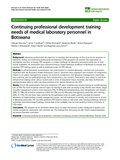Continuing professional development training needs of medical laboratory personnel in Botswana
Date
2014-08-18Author
Kasvosve, Ishmael
Ledikwe, Jenny J
Phumaphi, Othilia
Mpofu, Mulamuli
Nyangah, Robert
Motswaledi, Modisa S
Martin, Robert
Semo, Bazghina-werq
Publisher
Human Resources for HealthRights
This is Open Access article distributed under the terms of Creative Commons Attribution LicenceRights holder
Kasvosve et alMetadata
Show full item recordAbstract
Background: Laboratory professionals are expected to maintain their knowledge on the most recent advances in laboratory testing and continuing professional development (CPD) programs can address this expectation. In developing countries, accessing CPD programs is a major challenge for laboratory personnel, partly due to their limited availability. An assessment was conducted among clinical laboratory workforce in Botswana to identify and prioritize CPD training needs as well as preferred modes of CPD delivery.
Methods: A self-administered questionnaire was disseminated to medical laboratory scientists and technicians registered with the Botswana Health Professions Council. Questions were organized into domains of competency related to (i) quality management systems, (ii) technical competence, (iii) laboratory management, leadership, and coaching, and (iv) pathophysiology, data interpretation, and research. Participants were asked to rank their self-perceived training needs using a 3-point scale in order of importance (most, moderate, and least). Furthermore, participants were asked to select any three preferences for delivery formats for the CPD.
Results: Out of 350 questionnaires that were distributed, 275 were completed and returned giving an overall response rate of 79%. The most frequently selected topics for training in rank order according to key themes were (mean, range) (i) quality management systems, most important (79%, 74–84%); (ii) pathophysiology, data interpretation, and research (68%, 52–78%); (iii) technical competence (65%, 44–73%); and (iv) laboratory management, leadership, and coaching (60%, 37–77%). The top three topics selected by the participants were (i) quality systems essentials for medical laboratory, (ii) implementing a quality management system, and (iii) techniques to identify and control sources of error in laboratory procedures. The top three preferred CPD delivery modes, in rank order, were training workshops, hands-on workshops, and internet-based learning. Journal clubs at the workplace was the least preferred method of delivery of CPD credits.
Conclusions: CPD programs to be developed should focus on topics that address quality management systems, case studies, competence assessment, and customer care. The findings from this survey can also inform medical laboratory pre-service education curriculum.

